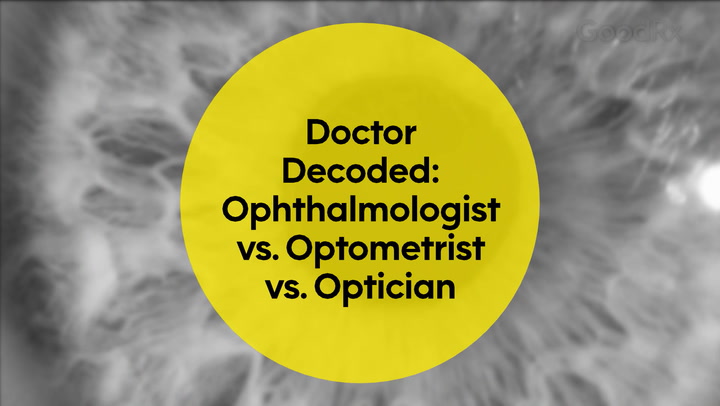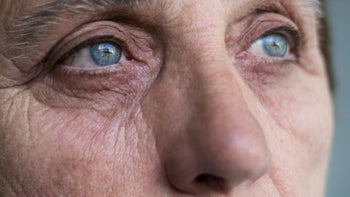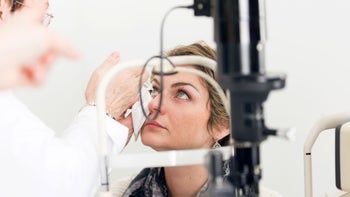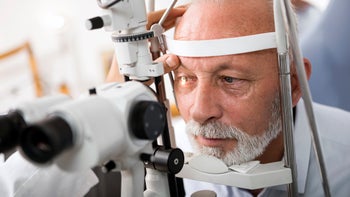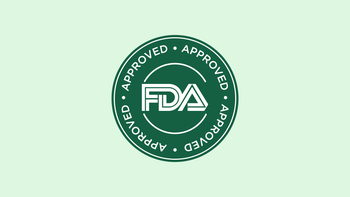
Vitamins for Macular Degeneration: Which Vitamins Can Keep Your Vision Healthy
Key takeaways:
Age-related macular degeneration (AMD) is a common cause of vision loss in older adults.
Macular degeneration vitamins include zinc, copper, vitamins C, E, lutein, and zeaxanthin. These supplements may keep the condition from worsening in some people.
Vitamins slow down intermediate macular degeneration by up to 25%. Late-stage dry AMD can be slowed by more than 50% over 3 years.

Age-related macular degeneration (AMD) is one of the leading causes of blindness worldwide. Receiving a diagnosis of this condition can be overwhelming because it affects the macula, a key part of your vision. The macula is the central part of the retina (the back layer of the eye). When the macula is damaged, a person starts to lose their central vision. This makes it difficult to do day-to-day tasks, like reading or driving.
If you or a loved one has received a diagnosis of macular degeneration, you may have heard about specific vitamins that can help with the condition. Macular degeneration vitamins may keep the condition from getting worse. But these eye vitamins don’t always work for everyone. And not every vitamin blend targeted toward eye health actually helps protect the eyes from worsening macular degeneration.
Let’s take a look at how macular degeneration vitamins work to protect the eye and which vitamins you need to keep your vision healthy.
What are the best vitamins for macular degeneration?
Studies show that specific combinations of vitamins and minerals can slow down macular degeneration. These vitamins include:
10 mg lutein
2 mg zeaxanthin
400 IU vitamin E
500 mg vitamin C (ascorbic acid)
80 mg zinc oxide
2 mg copper oxide
Many of these vitamins and minerals aren’t included in daily multivitamins. And not all vitamins marketed as supporting eye health include this exact combination. If you’re taking vitamin blends for macular degeneration, review the ingredients label to make sure your vitamin contains all the recommended supplements. Some macular degeneration vitamins are marked as “AREDS-2 formula” — after the Age-Related Eye Disease Study (AREDS) research that discovered their benefit.
Macular degeneration treatments: Explore all of the treatment options that can help preserve your vision longer.
Living with age-related macular degeneration (AMD): Four people share their story of how they’ve managed their AMD diagnosis.
AMD symptoms: Read more about how to spot the early signs and symptoms of AMD.
You may also notice some macular degeneration vitamins are labeled “AREDS-1.” This was the original formula and included beta-carotene instead of lutein and zeaxanthin. The AREDS-1 formula can increase your risk of developing lung cancer if you have a history of smoking cigarettes. If you currently smoke cigarettes, or you’ve smoked in the past, it’s safer for you to avoid beta-carotene or take the AREDS-2 formula.
How do macular degeneration vitamins work?
Macular degeneration vitamins work by slowing down intermediate and late-stage macular degeneration that can happen over time.
Some of the macular degeneration vitamins are antioxidants, including:
Vitamin C
Vitamin E
Lutein
Zeaxanthin
Antioxidants fight free radicals that can damage the body. Lutein and zeaxanthin are naturally present in the lens and retina, where they may fight off eye damage from UV (ultraviolet) light.
The body also converts lutein, zeaxanthin, and beta-carotene into vitamin A. Vitamin A helps the retina send signals to the brain so people can see.
Other minerals in macular degeneration vitamins, like zinc, play many important roles in the body. Zinc helps to protect the macula. High doses of zinc supplements can lead to copper deficiency. Copper doesn’t support vision health directly, but it supports other important body processes. The small amount of copper in AREDS vitamins prevents copper deficiency.
Omega-3 fatty acids are included in some AREDS vitamins. While they benefit eye health overall, omega-3 fatty acids don’t appear to slow down macular degeneration.
How effective are vitamins for macular degeneration?
The AREDS trial showed that macular degeneration vitamins slowed down the progression of intermediate macular degeneration to the advanced form by 25%. Vitamins also reduced the risk of vision loss by 19%. These benefits remained even 10 years after the study ended.
Once AMD is advanced, it can be classified as “wet” if you have developed leaking blood vessels under the retina or “dry” if you have not. A recent update to the AREDS-2 study offers a promise of preserving central vision for those with a particular type of macular degeneration.
In people with late-stage dry AMD, AREDS-2 supplements showed a 55% slowing of degeneration towards the region of the macula with sharpest vision over 3 years.
Keep in mind that there’s no cure for macular degeneration. But macular degeneration vitamins can be a powerful tool to maintain vision.
Who should take vitamins for macular degeneration?
People with intermediate and late-stage dry AMD benefit the most from AREDS vitamins. In this group, taking daily macular degeneration vitamins lowers the risk of developing late-stage macular degeneration and preserves eyesight longer.
If you have late-stage macular degeneration in one eye, taking a daily vitamin will slow down macular degeneration in your other eye.
Research suggests that people with late-stage dry AMD should continue to take AREDS-2 formula vitamins. But If you have early dry AMD, you might not get any benefit from taking macular degeneration vitamins. Talk with your eye doctor about whether AREDS vitamins are right for you.
Taking AREDS vitamins won’t prevent you from developing macular degeneration.
Some vitamins, like vitamin E, can interact with other medications, such as blood thinners and cholesterol medications. So make sure to talk with a healthcare professional about your medications before starting AREDS.
What other dietary changes can help with macular degeneration?
Diet changes don’t seem to slow down macular degeneration. But there are things you can add to your diet to support your vision health, like:
Leafy green vegetables, like kale and spinach, which contain lutein and zeaxanthin
Beans, lentils, dairy, seafood, and meat, which contain zinc
Citrus fruits, kiwis, and strawberries, which contain vitamin C
Avocado and olive oil, which contain vitamin E
A study from Europe showed that adapting a Mediterranean diet may lower the risk of macular degeneration. This diet focuses on whole foods, such as:
Fruits
Vegetables
Nuts
Fish
Whole grains
Frequently asked questions
Smoking and eating a diet high in processed sugary foods and red meats are risk factors for worsening macular degeneration. If you have macular degeneration you should stop smoking and follow a balanced diet. You should also talk with a healthcare professional about taking an AREDS2 supplement to help support eye health.
Most people diagnosed with AMD will not go blind. How fast the condition progresses depends on the type of AMD — wet AMD tends to progress faster than dry AMD. And if you smoke, the progression can be much faster. Less than 20% of people diagnosed with early AMD progress to late-stage AMD with significant vision loss within 5 years. If you have wet AMD, there are treatments that can help slow down the growth of new blood vessels that lead to vision loss.
Deficiency of several vitamins are associated with developing AMD or causing AMD to get worse. These include:
Vitamin B9 (folate)
Vitamin B12
Vitamin C
Vitamin D
Vitamin E
The bottom line
Macular degeneration vitamins can slow the progression of the condition, including those with late-stage dry AMD. The combination of vitamins and minerals were studied during the AREDS trials. They typically contain 10 mg lutein, 2 mg zeaxanthin, 400 IU vitamin E, 500 mg vitamin C, 80 mg zinc oxide, and 2 mg copper oxide. Keep in mind that macular degeneration vitamins can’t cure, reverse, or prevent macular degeneration. But they may help you keep your vision longer.
Why trust our experts?



References
Boyd, K. (2024). Mediterranean diet: Healthy eating for healthier eyes. American Academy of Ophthalmology.
Dunaief, J. (2023). Diagnosed with macular degeneration? Here’s what to expect. Macular Degeneration Research.
Dunaief, J. (2024). Vitamins for age-related macular degeneration: Do you have the correct formula? Macular Degeneration Research.
Gregori, N. Z., et al. (2024). Diet and nutrition. American Academy of Ophthalmology.
Khoo, H. E., et al. (2019). Nutrients for prevention of macular degeneration and eye-related diseases. Antioxidants.
National Eye Institute. (2020). AREDS/AREDS2 clinical trials.
National Eye Institute. (2020). AREDS/AREDS2 frequently asked questions.
National Eye Institute. (2023). Age-related eye disease studies (AREDS/AREDS2).
NIH News Release. (2018). NIH launches international study of AMD progression.
NIH News Release. (2024). Supplements slow disease progression during late stage of “dry” age-related macular degeneration.
Pereira, A., et al. (2023). Association between vitamin deficiencies and ophthalmological conditions.






